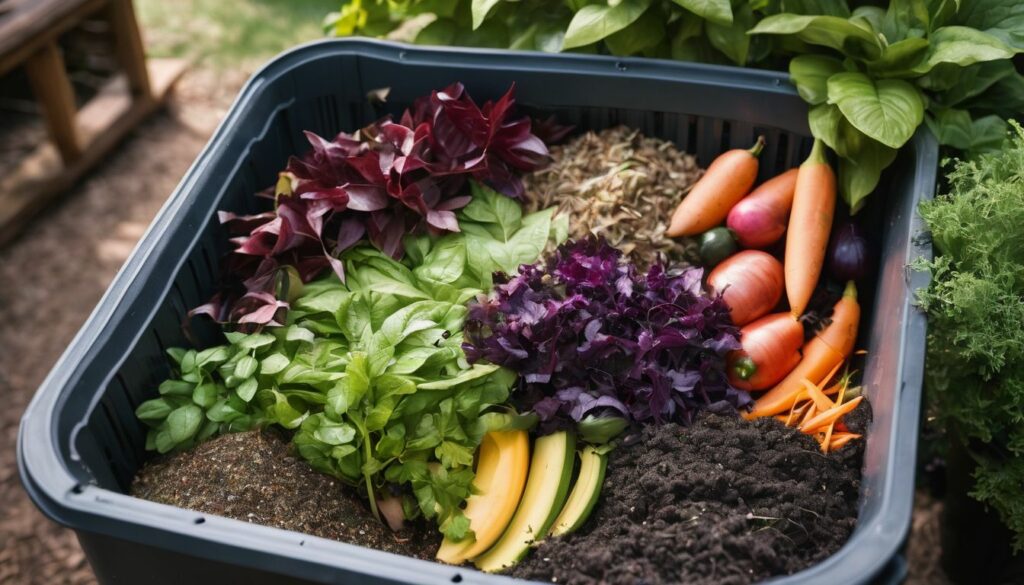Is your garden’s soil health leaving much to be desired, with a dishearteningly low nutrient yield? Trust me, I totally understand the struggle. That was until I stumbled upon the wonders of green manure – an age-old practice well-renowned for enhancing soil fertility dramatically.
This blog post is designed to steer you in the right direction on how to sow and reap the rewards from green manure right in your own backyard. Are you ready to give your gardening game a grand upgrade? Stay tuned!
Key Takeaways
- Green manure is a natural and sustainable way to improve soil health and fertility in your garden.
- Different types of green manure, such as legumes or grasses, offer specific benefits like nitrogen fixation or weed suppression.
- Planting cover crops or using the chop and drop technique are effective ways to incorporate green manure into your garden.
- Green manure improves soil health by increasing nutrient availability and reducing the need for artificial fertilizers.
Explaining Green Manure
Green manure is a natural and sustainable agricultural practice that involves planting specific crops to improve soil health and fertility.
Definition and benefits
Green manure is a special kind of crop. We grow it not for food, but to make the soil better. When we plant green manure, it soaks up good stuff from the ground like water and nutrients.
Once we cut it down or let it die off, all that goodness goes back into the earth. The next plants we grow in that spot will love this rich soil! Plus, green manure crops hold onto the dirt when rain falls hard.
They keep weeds away too! That makes a lot less work for us gardeners.
Different types
There are different types of green manure that can be used to improve soil health and nutrition in your garden. One type is legumes, such as clover, peas, and beans. Legumes have the ability to fix nitrogen from the air into a form that plants can use, which helps increase soil fertility.
Another type is grasses, like rye or wheat. Grasses are great for adding organic matter to the soil and improving its structure. Other options include brassicas (like mustard or radish) which help break up compacted soil and suppress weeds, and vetch which adds biomass to the soil.
Each type of green manure has its own benefits for your garden’s overall health and should be chosen based on your specific needs.
How to Incorporate Green Manure in Your Garden
To incorporate green manure in your garden, start by planting and growing cover crops or using alternative methods such as chop and drop.
Planting and growing cover crops
To incorporate green manure in your garden, you can start by planting and growing cover crops. These are specific crops that are grown to improve soil health and fertility. When cover crops are planted, they help prevent the loss of nutrients from the soil and keep it intact during heavy rainfall.
Additionally, they draw nutrients from the soil, which prepares it for subsequent crops. Planting cover crops is a sustainable agricultural practice that helps with weed management and reduces erosion.
It also adds organic matter to the soil, which enhances its fertility and structure. By incorporating cover crops into your gardening routine, you can promote healthy soil and ensure better nutrient availability for your plants.
Alternative methods such as chop and drop
Another alternative method for incorporating green manure into your garden is the chop and drop technique. Instead of planting cover crops, this method involves cutting down existing plants and leaving the plant material on the soil surface as mulch.
As the plant material decomposes, it adds organic matter to the soil, increasing its fertility and nutrient content. This technique can also help suppress weed growth and improve soil structure over time.
It’s a simple and effective way to enhance your garden’s health without having to invest in additional seeds or cover crops.”.
Nutritional Benefits of Green Manure
Green manure plays a vital role in improving soil health by increasing nutrient availability and enhancing overall fertility.
Improving soil health
Green manure is an excellent way to improve soil health. When we plant green manure cover crops, they help keep the soil intact and prevent nutrient loss during heavy rainfall. Additionally, these crops draw nutrients from the soil, preparing it for future plants.
By doing so, green manure improves soil fertility and structure. It also helps reduce erosion and increase organic carbon content in the soil. This means that by incorporating green manure into your garden or fields, you can enhance the overall health of your soil and promote sustainable agriculture practices.
Increasing nutrient availability
Green manure plays a crucial role in increasing nutrient availability in the soil. When we plant green manure cover crops, they draw nutrients from the soil, preventing their loss and keeping them available for future plants.
Additionally, these cover crops also add organic matter to the soil, which further enhances its nutrient content. By incorporating green manure into our gardening practices, we can ensure that our plants have access to the essential nutrients they need for healthy growth and development.
Environmental Benefits of Green Manure
Green manure offers significant environmental benefits by minimizing the need for artificial fertilizers and reducing weed growth, making it an eco-friendly choice for sustainable agriculture.
Minimizing the need for artificial fertilizers
Using green manure can greatly minimize the need for artificial fertilizers in your garden. Green manure crops, such as legumes, have the ability to fix nitrogen from the air and transfer it into the soil.
This natural process boosts soil fertility and reduces the reliance on synthetic fertilizers. By incorporating green manure into your gardening practices, you can save money and promote a more sustainable approach to nutrient management.
The cover crops help improve soil health and increase nutrient availability without introducing harmful chemicals into the ecosystem.
Reducing weed growth
Green manure cover crops play a crucial role in reducing weed growth in your garden. By planting these cover crops, you can smother weeds and prevent them from taking over. The dense foliage of green manure crops shades the soil, making it difficult for weed seeds to germinate and grow.
Additionally, some green manure plants release chemicals into the soil that inhibit weed growth. This natural method of weed control saves you time and effort by minimizing the need for manual weeding or chemical herbicides.
With green manure, you can enjoy a healthier and more productive garden with fewer invasive weeds to compete with your desired plants.
Choosing the Right Green Manure for Your Garden
When selecting a green manure for your garden, it’s important to consider the specific needs of your soil and crops.
Cultivar selection
Choosing the right green manure for your garden is crucial to maximize its benefits. When selecting a cultivar, consider factors such as climate, soil type, and the specific needs of your garden.
Additionally, think about what you want to achieve with your green manure crop – whether it’s nitrogen fixation, weed suppression, or improving soil structure. Remember that different plants offer different advantages: legumes like clover or vetch fix nitrogen in the soil, while grasses like rye or oats help build organic matter and prevent erosion.
By carefully selecting the right cultivar for your garden, you can ensure optimal results and improve both soil health and nutrient availability.
Potential problems and how to address them
Sometimes, there can be some problems when using green manure in your garden. One potential issue is that certain cover crops may become invasive and take over your garden space. To address this problem, it’s important to choose the right cultivar of green manure for your specific garden conditions.
Research which cover crops are best suited for your region and soil type, as some varieties are less likely to spread aggressively.
Another potential problem is nitrogen tie-up. Some green manures have high nitrogen content that can temporarily lock up nutrients in the soil, making them less available to other plants.
To address this issue, you can either wait for the green manure to decompose completely before planting other crops or incorporate nitrogen-rich amendments like compost or organic fertilizers into the soil.
It’s also important to properly manage weed growth when using green manure. While cover crops can help suppress weeds, if they are not managed properly, they themselves can become weedy and compete with other plants in your garden.
Address this problem by regularly monitoring and managing weed growth through mulching or manual removal.
Conclusion
In conclusion, incorporating green manure in your garden can have numerous benefits for soil health and nutrition. Planting cover crops or utilizing alternative methods like chop and drop can improve soil fertility, increase nutrient availability, minimize the need for artificial fertilizers, and reduce weed growth.
By choosing the right green manure for your garden and addressing potential problems, you can enhance soil health and contribute to sustainable agriculture practices. So why not give green manure a try and see the positive impact it can have on your vegetable garden?.
FAQs
1. What are the benefits of green manure?
Green manure helps improve soil health and nutrition through planting. It’s a good fit for organic farming, it adds nutritional value to the soil.
2. How does green manure help in crop rotation?
Using green manure in crop rotation helps with nutrient cycling. It makes the soil rich and boosts ecosystem services.
3. Can I use green manure in my vegetable garden?
Yes! Green manure can help enrich your vegetable garden’s soil by natural fertilization and plowing.
4. Is using green manure a common practice in organic farming?
Yes, many who do organic farming use green manure because it improves nutrient cycling as part of their agricultural practices.





